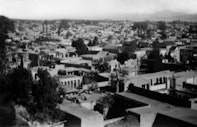What Bahá’ís Believe
Bahá’u’lláh and His Covenant
Bahá’u’lláh – The Divine Educator
Articles and Resources
- What Bahá’ís Believe
- Overview
- Bahá’u’lláh and His Covenant
- The Life of the Spirit
- God and His Creation
- Essential Relationships
- Universal Peace
- What Bahá’ís Do
A selection of essays, articles, and resource materials which further explore the life of Bahá’u’lláh and His mission.
Writings of Bahá’u’lláh
Composed in Baghdad in 1274 AH (1857-8 CE), Bahá’u’lláh describes the Hidden Words as a distillation of the spiritual guidance contained in the successive Revelations of God. Shoghi Effendi called it Bahá’u’lláh’s pre-eminent ethical work.
The Kitáb-i-Aqdas (the “Most Holy Book”) was revealed by Bahá’u’lláh in response to repeated requests from His followers for laws to follow. In it, Bahá’u’lláh sets out laws in relation to such areas of life as prayer, fasting, and pilgrimage.
The Kitáb-i-Íqán (the “Book of Certitude”) was revealed by Bahá’u’lláh in Baghdad in 1861/62. Within its pages are found explorations of such subjects as the nature of the human being, the purpose of life, the relationship of humanity to God, and the importance of Revelation.
This selection of extracts from the Writings of Bahá’u’lláh was translated and compiled by Shoghi Effendi and first published in 1935.
The Epistle to the Son of the Wolf was revealed by Bahá’u’lláh around 1891. It takes the form of an extended letter addressed to a cleric who, along with his father—denounced as “the wolf”—had violently persecuted a number of Bahá’ís.
In this collection of Writings from 1868 to 1870 Bahá’u’lláh sets forth the nature of His mission to the monarchs and political leaders of His time, and describes the standard of justice required by a maturing human civilization.
Tablets of Bahá’u’lláh was published in 1978. It contains sixteen Tablets, including the Tablet of Carmel—described by Shoghi Effendi as the Charter establishing the World Spiritual and Administrative Centres of the Bahá’í Faith on Mount Carmel—and the Tablet of Wisdom, in which Bahá’u’lláh explores the subject of human knowledge.
This collection of Bahá’u’lláh’s Writings, selected and translated by Shoghi Effendi, includes prayers, tablets and intensely personal meditations on Bahá’u’lláh’s imprisonment and the sufferings of His followers.
In this mystical work, Bahá’u’lláh describes the stages of the soul’s journey to union with its Creator in terms of seven valleys—of search, love, knowledge, unity, contentment, wonderment, and ‘true poverty and absolute nothingness’.
This early work, revealed during Bahá’u’lláh’s sojourn in Baghdad, deals with a number of subjects including the continuity of Divine Revelation.
First published in English in 2006, this volume contains writings of Bahá’u’lláh that address questions raised by Manikchi Sahib, a prominent Zoroastrian. In His answers, Bahá’u’lláh elucidates some of His fundamental teachings.
Other Resource Materials
This article was originally published as part of a collection of talks given by ‘Abdu’l-Bahá titled Some Answered Questions. In it, ‘Abdu’l-Bahá says of His Father: “We must be just and acknowledge what an Educator this Glorious Being was, what marvellous signs were manifested by Him, and what power and might have been realized in the world through Him.”
This extract from a letter of Shoghi Effendi, addressed to the Bahá’ís of the West and known as The Dispensation of Bahá’u’lláh, describes in detail the station of Bahá’u’lláh and the significance of His message for humanity.
This special tribute was first read at the commemorative events marking the 100th anniversary of the passing of Bahá’u’lláh, held at His Shrine in May 1992.
This brief introduction to Bahá’u’lláh’s life and work was prepared at the request of the Universal House of Justice on the occasion of the centenary of His passing in 1992.
Further Reading
A list of further reading on this subject is available here.







